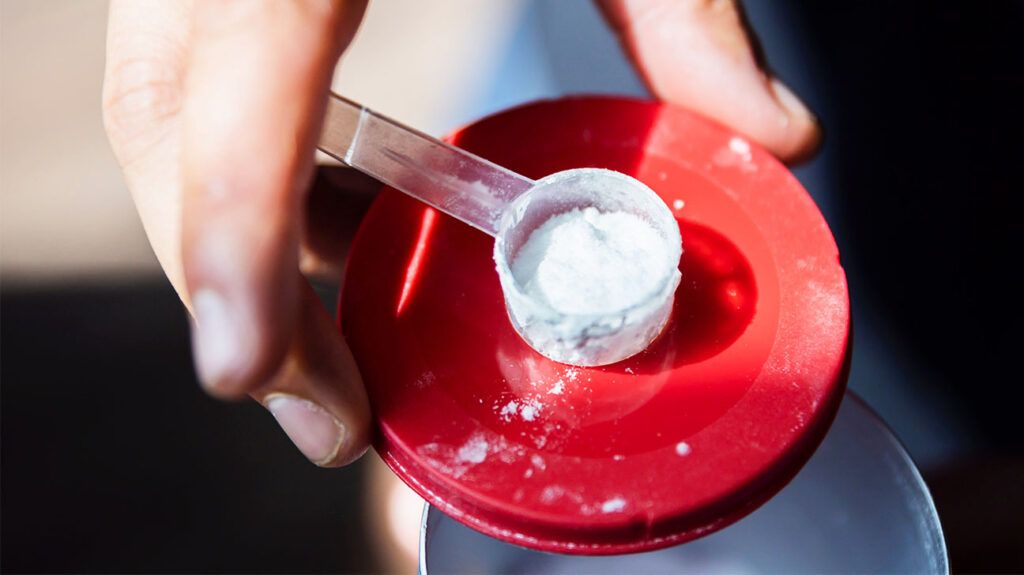When a person begins to take creatine, they may experience some bloating during the loading phase. During this phase, they consume a daily dose of 20 grams (g) to 25 g of creatine for 5 to 7 days.
After this, they focus on maintenance, and the dose drops to approximately
Creatine generally has a good safety profile despite causing some bloating in the loading phase. However, because there is not enough research on the long-term effects of creatine supplementation in children and adolescents, they should not take it.
Read on to learn more about creatine and bloating, including how to take creatine safely, potential side effects, and tips to help prevent bloating.

Creatine is a naturally occurring acid that the body produces. People can also
In addition to providing muscles with energy, creatine supplementation may offer other health benefits, according to research. For example, creatine may
Moreover, creatine supplementation may also support brain health. A
Further resources
For more in-depth resources about vitamins, minerals, and supplements, visit our dedicated hub.
During the loading phase, a person consumes approximately
Loading creatine may cause a 2% increase in body weight and bloating. According to older 1999 research, this is due to an increase of:
- muscle water content
- phosphocreatine
- creatine
- glycogen
Consequently, athletes who are participating in a sport where extra weight could harm their performance, such as running, will need to plan when a loading phase takes place.
Furthermore, older research from 2010 suggests that some athletes may lose joint flexibility during the loading phase, for example, in their shoulders and ankles. This is due to cells that increase muscle stiffness retaining more water.
While the effects of load bloating are temporary, a person may be able to avoid them if they forgo the loading phase altogether. A more gradual dose of 3 g to 5 g per day still increases creatine levels to saturation. However, the time is considerably longer, at around 28 days.
When a person takes creatine, they should always follow the dosage guidelines on the packaging. Studies indicate that creatine is safe in dosages up to
However, if a person has received advice from their doctor not to take creatine or to adjust the dose, they should follow this advice.
It is important to keep in mind that the Food and Drug Administration (FDA) does not regulate health supplements, including creatine. Consequently, creatine products can vary in quality and safety.
Researchers of a 2021 review
- athletes involved in competitive or serious supervised training
- knowledgeable about using creatine safely
- not exceeding the recommended dosage
- eating a balanced diet that is tailored for training
Currently, there is insufficient research to determine how the long-term use of creatine affects major organs, such as the heart, brain, liver, and kidneys.
Moreover, even fewer studies focus on interactions between creatine and over-the-counter medications, prescription drugs, and other supplements, such as multivitamins.
A person should stop taking creatine if they experience any of these side effects:
If someone is trying to lose weight or is dehydrated, they should avoid taking creatine supplements.
Bloating has many causes, including creatine loading, so a person may need to make several changes before noticing a reduction in their symptoms.
Some
- avoiding drinking carbonated beverages and drinking with a straw
- eating more slowly and, whenever possible, sitting down to eat instead of eating while walking
- avoiding chewing gum and sucking on hard candy
- avoiding talking while eating or drinking
- quitting smoking, if applicable
- checking with a dentist to make sure dentures fit correctly, if applicable
- keeping a food diary to identify if certain foods trigger bloating
- discussing management techniques and medications for gastrointestinal conditions, such as irritable bowel syndrome (IBS) and celiac disease, with a doctor, if applicable
A person should speak with a doctor if abdominal bloating:
- is accompanied by other symptoms, such as diarrhea or abdominal pain
- interferes with daily life
- occurs suddenly
- worsens or does not improve with lifestyle changes
Creatine can cause bloating during the loading phase, which is when someone takes
The supplement does have a good safety profile. However, it can cause side effects, and further research into the safety of long-term use is necessary. It is also important to consider that the FDA does not regulate supplements, so some creatine supplements may be safer than others.
A person should speak with a healthcare professional for further information about taking creatine safely.
